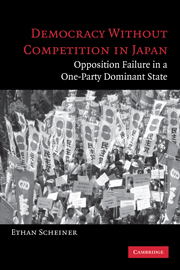Book contents
- Frontmatter
- Contents
- Tables and Figures
- Glossary of Abbreviations
- Acknowledgments and a Note on the Use of the Online Appendix
- Introduction: The Puzzle of Party Competition Failure in Japan
- 1 The Importance of Party Competition and a Model of Party Competition Failure
- 2 Opposition Failure in Japan: Background and Explanations
- 3 Clientelism and Its Determinants
- 4 The Impact of Clientelism and Centralized Government Financial Structure: Comparative Analysis
- 5 Local Opposition Failure in Japan
- 6 National-Level Opposition Failure: The Impact of Subnational-Level Weakness
- 7 Political Economy Changes and Their Impact on Party Systems: Comparative Analysis
- 8 Parallel Party Systems: Political Economy Changes and the Limits to Anti-Clientelist Appeals in Japan
- 9 The Problem of Organization and Coherence in Top-Down Party Formation
- 10 Conclusion: Democracy Without Competition
- References
- Index
10 - Conclusion: Democracy Without Competition
Published online by Cambridge University Press: 02 December 2009
- Frontmatter
- Contents
- Tables and Figures
- Glossary of Abbreviations
- Acknowledgments and a Note on the Use of the Online Appendix
- Introduction: The Puzzle of Party Competition Failure in Japan
- 1 The Importance of Party Competition and a Model of Party Competition Failure
- 2 Opposition Failure in Japan: Background and Explanations
- 3 Clientelism and Its Determinants
- 4 The Impact of Clientelism and Centralized Government Financial Structure: Comparative Analysis
- 5 Local Opposition Failure in Japan
- 6 National-Level Opposition Failure: The Impact of Subnational-Level Weakness
- 7 Political Economy Changes and Their Impact on Party Systems: Comparative Analysis
- 8 Parallel Party Systems: Political Economy Changes and the Limits to Anti-Clientelist Appeals in Japan
- 9 The Problem of Organization and Coherence in Top-Down Party Formation
- 10 Conclusion: Democracy Without Competition
- References
- Index
Summary
Democracy is unthinkable save in terms of parties.
E. E. Schattschneider (1942: 1)Above everything, the people are powerless if the political enterprise is not competitive. It is the competition of political organizations that provides the people with the opportunity to make a choice. Without this opportunity popular sovereignty amounts to nothing.
E. E. Schattschneider (1960: 137)Japanese democracy is a puzzle. We typically conceive of democracy as based on competition. One-party democracy is not supposed to happen. This study sought to understand the puzzle of party competition failure and explain how, even when facing a cynical and alienated public, a single party could remain so dominant and an opposition could be so ineffective.
Competition is critical to democracy. Fundamental to democracy is the principle that all rule is ultimately accountable to the people. Within modern democracy, this process works through representatives who, themselves, are accountable to citizens through regular elections. To overcome collective action and social choice problems, representatives organize in political parties (Aldrich 1995), which makes parties also accountable to the public. When parties enter the government, as Manin, Przeworski, and Stokes note, they “are ‘accountable’ if voters can discern whether governments are acting in their interest and sanction them appropriately, so that those incumbents who act in the best interest of citizens win reelection and those who do not lose them” (1999: 40). One would assume that incumbents who get reelected are those deemed by voters to be working in their best interest.
- Type
- Chapter
- Information
- Democracy without Competition in JapanOpposition Failure in a One-Party Dominant State, pp. 210 - 232Publisher: Cambridge University PressPrint publication year: 2005
- 1
- Cited by



